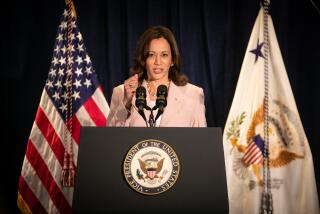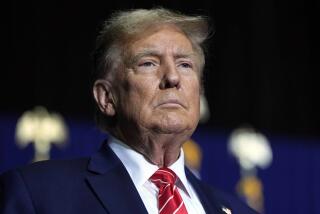In Money Poll, Bush Looks Uncatchable
- Share via
WASHINGTON — The poll numbers may show Sen. John McCain slightly ahead of Texas Gov. George W. Bush in New Hampshire but, in the race for campaign money, Bush’s leading challenger for the Republican presidential nomination is not in the same galaxy.
Campaign finance reports filed with the Federal Election Commission on Monday showed that Bush had more than $31 million in cash on hand at the end of December, while McCain finished the year with only $2.1 million.
That gap translated into strikingly different spending behavior. Bush has spent more than twice as much money on air time for television commercials than McCain and is using his deep pockets to introduce himself to TV viewers in states where primaries are scheduled over the next several weeks.
Overall, the Bush campaign spent almost five times as much as the McCain campaign in the final three months of 1999, $17.3 million to $3.6 million.
Bush, who raised a record-breaking $67 million in 1999, has forgone federal matching funds for the primary season and, therefore, faces no federal limits on the amount of money he can raise or spend.
Monday’s filings underscore the size of Bush’s financial advantage over the entire field of candidates. The Republican front-runner already has spent almost as much money--$37.3 million--as most of the other candidates can spend for the duration of the campaign. Candidates receiving federal matching funds are limited to spending about $40 million.
The $6.6 million Bush has spent on television ads also far outpaced the Democratic contenders. As an early indication of how the Texas governor’s record-breaking war chest could help him against the eventual Democratic nominee--if he wins the nomination--Bush’s ads ran in nine states while Democrats Bill Bradley and Al Gore ran ads only in Massachusetts, Iowa and New Hampshire.
In the meantime, Bush’s financial reserves could help him weather a potential loss to McCain in New Hampshire today with minimal damage.
“I’m in it for the long pull,” Bush said a few days ago. “I’ve got organizations in the states beyond New Hampshire.”
But Mike Murphy, McCain’s campaign director, said that Bush’s money will not be enough to help him if McCain wins both New Hampshire and the Feb. 19 GOP primary in South Carolina, cracking Bush’s vaunted aura of inevitability.
“All the king’s horses and all the king’s men won’t put inevitability back together again,” Murphy said. “It’s about message.”
The McCain campaign has been busy fund-raising in January and is owed $6.3 million in matching funds from the federal government, so its coffers are not empty, despite relatively heavy spending in New Hampshire, said campaign manager Rick Davis.
McCain has spent $2.9 million on television ads in five states: Massachusetts, New Hampshire, Maine, Michigan and South Carolina, according to Campaign Media Analysis Group, an independent media tracking company, based here.
Although the McCain camp was full of David-versus-Goliath bluster, some Democrats betrayed a bit of nervousness about the prospect of running an uphill financial race all the way to November.
On the Democratic side, a tough race between Gore and Bradley means that the party’s nominee likely will have dwindled resources when his focus switches to the general election. Counting federal matching funds, Bradley and Gore each have close to $20 million, according to their campaigns, and federal funds for the general election will not be released until August.
Republican candidate Bob Dole found himself outspent--and out-campaigned--in the 1996 election. President Clinton, who had no Democratic opponent, had spent broadly in the late spring and early summer.
“People get sort of depressed--look at what happened to [Bob] Dole--and think it could happen this cycle,” said a senior Gore aide.
But Bradley’s fund-raising successes indicate that even if he is trounced in New Hampshire, he can easily stay in the race.
“We’ve always looked at this as a national campaign, so we’re organized and we’ve focused the campaign accordingly,” said Tony Wyche, a Bradley spokesman. He added that Bradley intends to “compete everywhere” on March 7, when there will be 13 contests, including in California and New York.
Indeed, Bradley’s campaign outspent Gore in the last three months of last year, $10.9 million to $8.7 million.
“We’ve controlled our administrative spending so we could devote more resources to where it really counts,” said Kathleen Begala, Gore’s communications director.
*
Times staff writers Steve Braun, James Gerstenzang, Maria L. La Ganga, T. Christian Miller and Janet Wilson contributed to this story from New Hampshire.
More to Read
Sign up for Essential California
The most important California stories and recommendations in your inbox every morning.
You may occasionally receive promotional content from the Los Angeles Times.













